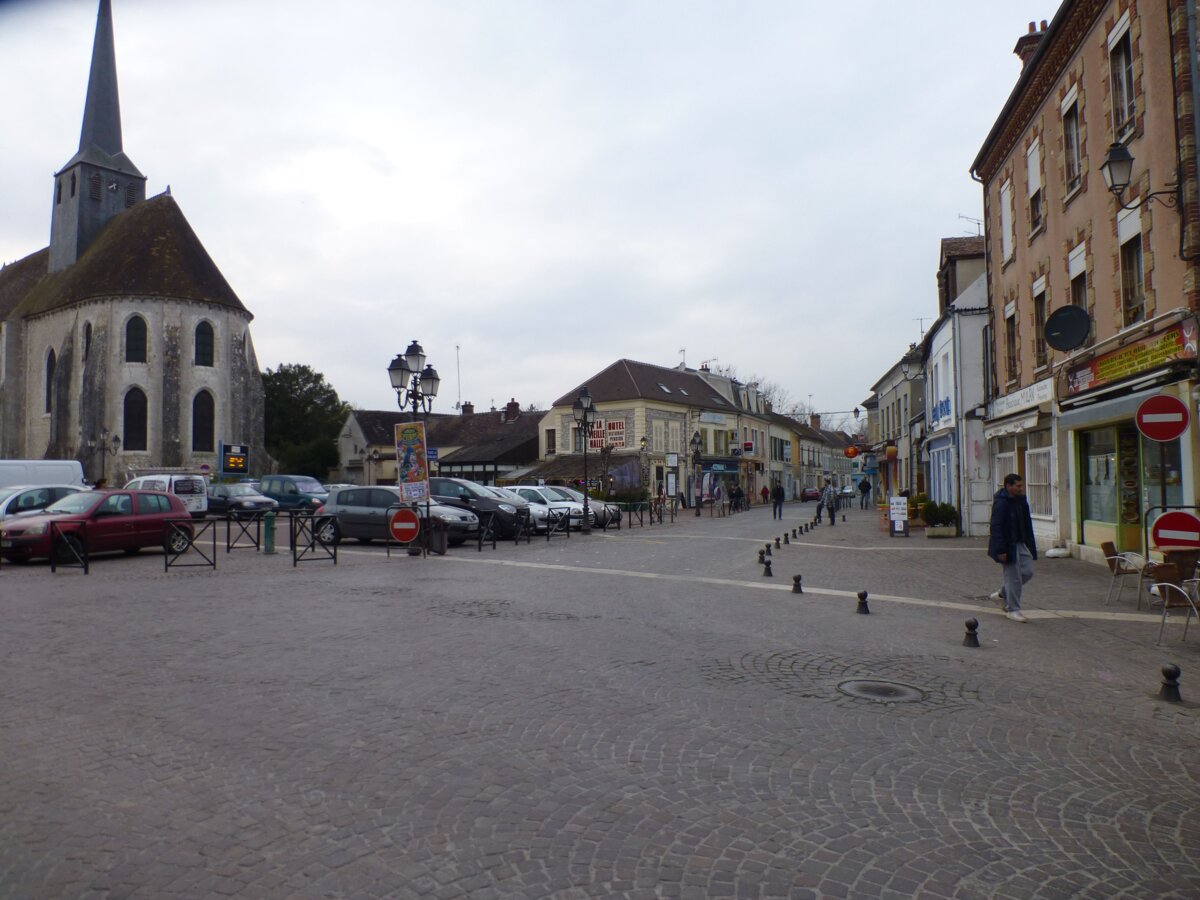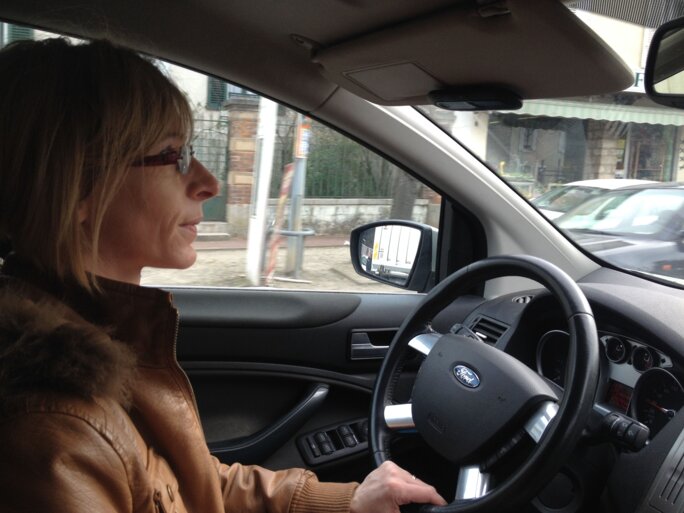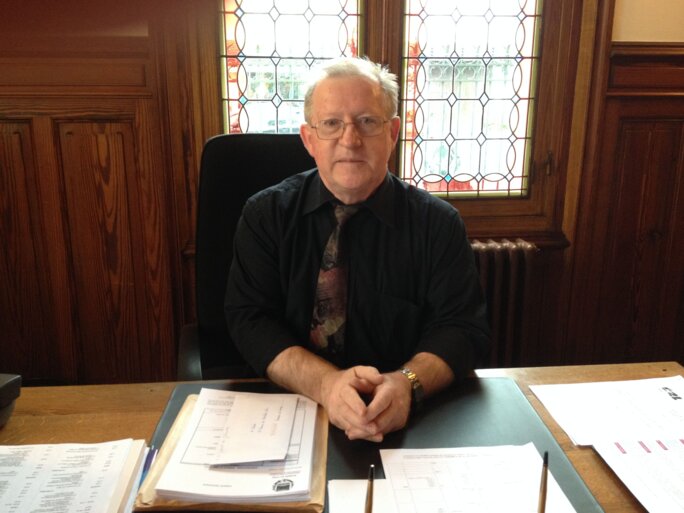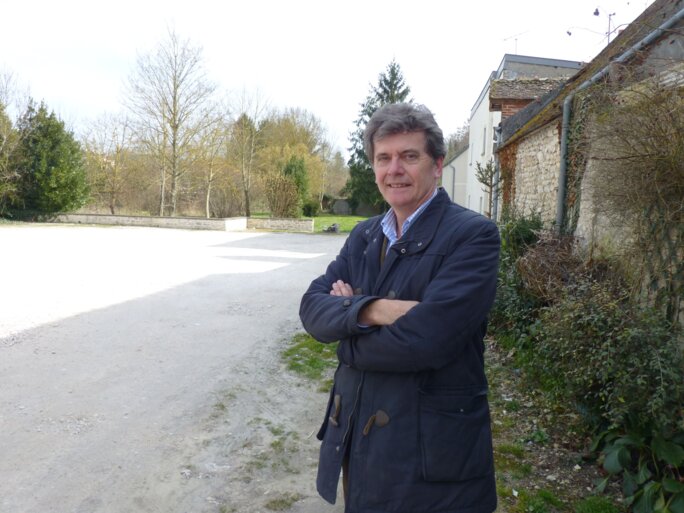In the bar La République which stands on the square of the same name in Souppes-sur-Loing, Céline Rigault needed little encouragement to vent her exasperation: "My doctor has retired,” she said, “since then it has been impossible to find a new one. We went through the whole phone book, we called all the GPs in a 20-kilometre radius. They are all overbooked." Her recourse is to go to the hospital emergency unit in nearby Nemours, but the waiting time there is long. Taking her two children to the paediatrician in Fontainebleau is a 45-minute drive.
Now there are only four general practitioners (GPs) left in Souppes, as the town is more commonly known. Another one in the surrounding area works half time, making five doctors, all aged over 55, for a locality with 20,000 inhabitants altogether. Four GPs retired in the past few years, and not one was replaced. No one can remember the last time a new doctor set up practice in the area.

Enlargement : Illustration 1

This problem affects fully half of the Seine-et Marne département (equivalent to a county) in which Souppes is located. "The eastern half of the département, from the north right to the south, is affected by medical desertification," said David Bresson, the general councillor in charge of health matters at the Seine-et-Marne council. "Even in Melun, where the prefecture1 is located, doctors are not taking on any new patients. Everyone is affected – finding a GP has become a recurring subject of conversation in the corridors at the Département [council]. Here, free choice of your doctor2 is a mirage."
At the surgery of Drs. Bauwens and Braun in Souppes, the secretary, Anita Da Silva Campos, has the unenviable job of turning away patients "all day long, by the dozen". An unpleasant task. "How many times have I been told, 'you are letting us die!' I also put myself in the patient's place," she said.
Dr. Michel Bauwens sees no way out of the problem. "Demand for care is increasing at a time when the supply of care is constantly falling," he said. He has to lengthen the time between check-ups for the chronically ill, "sometimes beyond what is reasonable”.
“For example, I see diabetics every three, four or six months,” he explained. “Before, I would renew their prescriptions every month or every three months."
But that is no longer enough, according to his partner, Dr. Joël Braun. "For the moment, we refuse new patients who ask us to become their GP,” he said. “There have been two retirements in the past few months, and we cannot take on the demand. We already hold surgery 55 hours a week, we cannot do more. I am 66, and on the contrary, I would like to be able to ease off a bit."
The surgery survived the winter flu period, but not entirely unscathed. Dr. Bauwens said the local health system had failed. "We did not manage to control the pathology. There were a lot of deaths." According to the latest estimates from the Institut National de Veille Sanitaire (InVS, the French health watchdog), there were 12,000 more deaths from flu this past winter – not a particularly cold one – than the average recorded in the previous eight winters, and particularly among people aged over 65. The town's doctors were worn out after the winter period, said Dr. Bauwens, adding that some even turned away serious cases.
Among those left with no GP is a former schoolteacher in nearby Bagneaux-sur-Loing, an industrial village of nearly 2,000 inhabitants some 6 km from Souppes. Both its GPs, a couple, retired at the end of 2014. Before the former schoolteacher had taken that on board, she was struck down by a neurological disease that left her an invalid, said Alexandra Bendyoukoff, the independent nurse who looks after her.
"The hospital let her go home without having a GP. I was flabbergasted," Bendyoukoff said. "She had run out of drugs. I contacted Dr. Bauwens to explain the situation. Exceptionally, he came to see her. But all he does is renew her prescriptions. Now, she has no medical supervision any more."
Another elderly woman, Éliane Labe, a diabetic, only sees her doctor every three months, but she says it doesn't bother her. She had to have a leg amputated after a sore on her foot began to be gangrenous, a well-known complication of diabetes. A former château caretaker, she is bed-ridden, living in tiny quarters with her handicapped son and a pension of less than 600 euros a month – so a retirement home is not an option. "I don’t complain, I get on well with my son," she said. Her nurses come round twice a day, including weekends.
-------------------------
1: The prefecture is the seat of the regional or departmental prefect, and is located in the most prominent town, corresponding to the county town in the British system.
2: The French health system allows patients to choose their own General Practitioner, but they must declare their choice to Social Security in order to be reimbursed for consultations. Most doctors in France work in private practice, and are paid either directly by the patient’s state health insurance provider, or by the patient, who is then reimbursed via the state insurer.
Pinning hopes on a new health centre

Enlargement : Illustration 2

The burden has been passed to local independent nurses such as Véronique Magniadas, who sometimes feels abandoned in her dealings with patients. "We renew prescriptions, we prescribe dressings, we keep an eye on diabetics’ insulin," she said. "We are the ones who watch out and alert the doctor." But is this transfer of doctors' responsibilities to nurses really legal? Those involved avoid the question.
In Drs. Bauwens and Braun's waiting room the patients tell of their experiences. "Young doctors don't like the countryside, and our old doctors don't come out at night anymore," said one woman waiting with her husband. "Even for my husband's heart condition, we have to call the emergency services." For another woman, a non-working mother of four, there is "a feeling that the doctors are mainly working for the money. I don’t understand why they refuse to see a child with a temperature of 40°C. I don't enjoy adding to the overcrowding in the emergency room, waiting there for a whole day just over a cold."
Then there are those with inadequate Social Security cover1. Ricardo Gomez, a young man waiting with his mother who will be paying 33 euros for his consultation, is on a work experience scheme where he earns 300 euros a month and has to count every cent. "Rural areas have been abandoned," he said. He does not even have the most basic form of Social Security cover, called CMU2. He had not thought to ask the doctors to use the scheme under which his consultation would be directly reimbursed by Social Security, but in any case the consultation costs more than the standard Social Security reimbursement3.
Drs. Bauwens and Braun will put consultations through the direct reimbursement system, called Tiers Payant, but only if patients ask for it. Everyone in the waiting room knows the government is trying to pass a law that would make that system the norm, and they await it eagerly.
The Loing Valley, which runs from Montargis to Nemours, used to be largely industrial. The glass industry at Bagneaux-sur-Loing once employed some 3,500 workers, but now only 500 still work in the industry. The local economy consists of a bit of agriculture and a lot of service activities. Average revenue per household is 21,000 euros a year, and unemployment already stood at 15.7% in 2011. Only 55% of households earn enough to pay income tax.

Enlargement : Illustration 3

The mayor, Pierre Babut, who is not affiliated to any political party, says the area is typical of the fringes of Île-de-France, the Greater Paris region. "We get a population that has been rejected by the big towns, unemployed, with difficult living situations," he said. In the parts of Souppes with suburban houses there is a middle class who come to the town to buy more cheaply, but they generally endure long journeys to and from work every day. "Are we in social decline? The question needs to be asked," he said.
Local people answered it in their own way at the recent département council elections in March. The far-right Front National won 47% of the vote in Souppes, against 53% for the mainstream Right. The far-right party's vote over the whole Nemours canton was 42%.
Now the mayor has made ensuring continuity of medical care one of his priorities. There are plans to build a health centre, one of Babut's two projects for his mandate – the other is for an Auchan supermarket. The health centre site has been chosen, architects are working on the plans and financing has almost been finalised. "The project will cost 1.8 million to 2 million euros for a 700-square-metre clinic," Babut said. Of this, the government will contribute a 400,000 euro subsidy, Île-de-France region 200,000 euros and the Seine-et-Marne council 300,000 euros. "The commune will probably have to borrow 1 million euros, no more." The health professionals working there will pay rent, which will partially offset the loan.
The only criticism of the plan comes from Syvlie Legros, municipal general manager for local services. "Health is not part of a local authority remit," she said. Certainly this investment aims to correct a major dysfunction of the national health system, which is the responsibility of the government and the health insurance system. And it comes at a time of falling government allocations to local authorities. In Souppes, the budget is to be reduced by 20%, - or 1 million euros - over three years, Babut explained.
-------------------------
1: Under the French health system, patients are reimbursed by occupational public health insurance schemes complemented by mutual insurance funds.
2:The CMU (Couverture Maladie Universelle), instituted in 2000, offers basic Social Security cover to anyone living in France for more than 3 months who is not covered by state health insurance schemes. But to benefit from it, people must apply and renew their cover regularly. That means that some still fall outside the Social Security safety net.
3: State health insurers reimburse a visit to the GP at 70% of the set price of a consultation, 23 euros, so the patient receives 15.10 euros. The balance is made up by the patient’s mutual insurance, if they have one. Many doctors charge more than 23 euros for a consultation.
'A society-wide debate is necessary'

Enlargement : Illustration 4

But the project has met with broad consensus, supported by all the town’s medical professionals –doctors, nurses, dentists, physical therapists, chiropodists – and who have together formed an association for the structure.
The mayor says the health centre is awaited “with impatience” and has promised it will open in 2016. Some, however, are sceptic. “I’ve been hearing about this centre since setting up in 2008,” said the owner of the town’s only chemists shop, Véronique Fugeray. “I am very sceptical. The medical desertification has a direct impact on our turnover, which is beginning to fall. In the neighbouring villages, some chemists are in serious difficulty. The town is changing. The population is becoming poor, the doctors are leaving. I get the impression that I’m living in a far flung corner of the Lozère.”
Independent nurse Véronique Magniadas warned: “If nothing happens before the end of the year, we’ll give up. But without this health centre Souppes will no doubt have no more medical professionals left in a few years.
Souppes-sur-Loing has one young GP. Marc Alix, 30, replaces the doctors Bauwens and Braun two days per week and during their holidays - and many of the townsfolk wonder if he wants to settle down full-time. “I followed my wife, a teacher at the secondary school, and I am very happy to be here,” he said. “This semi-rural experience doesn’t frighten me.” But there is one thing that discourages him. “If the health centre doesn’t happen, in five years all the GPs will have retired. If I set up here I’ll find myself on my own.” He is aware of the health and social costs of this abandonment of a section of the population by the medical professionals, but he underlines: “This desertification was foreseeable, expected. “Politicians let things happen. I don’t know how the situation will evolve. We are independent, free to set ourselves up where we wish. On the other hand, we are paid by the social security system, and everyone has the right to treatment. There is an antagonism in this. A society-wide debate is necessary.”
Speaking on condition he was not named, a manager with the Seine-et-Marne local authorities, who in the recent elections switched his vote from the Left to the Right, pointed to the weakness of the health minister Marisol Tourraine policies. “Marisol Tourraine wants to make the move to the outpatient method, rebalancing the health system towards home care. It’s a very good idea. But what does one do in such deserted zones? The policies to incite young doctors to set up are tinkering measures, not at all worthy of the situation. The doctors’ unions, which refuse any reflection on medical demography, also carry a heavy responsibility. What are we waiting for? For there to be deaths? On a daily basis, to progress, I try to put to one side the health consequences. Otherwise I lose hope.”
-------------------------
- The French version of this article can be found here.
English version by Sue Landau and Graham Tearse


